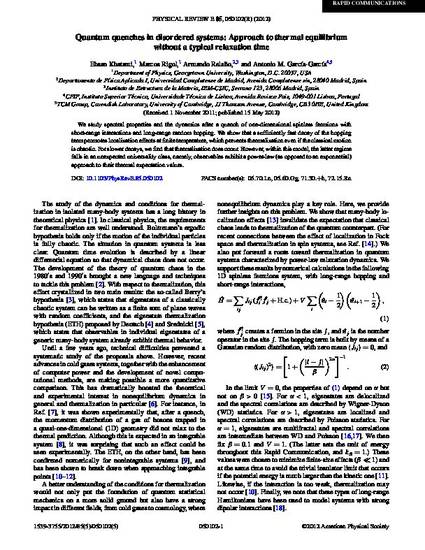
Article
Quantum quenches in disordered systems: Approach to thermal equilibrium without a typical relaxation time
Physical Review E
(2012)
Abstract
We study spectral properties and the dynamics after a quench of one-dimensional spinless fermions with short-range interactions and long-range random hopping. We show that a sufficiently fast decay of the hopping term promotes localization effects at finite temperature, which prevents thermalization even if the classical motion is chaotic. For slower decays, we find that thermalization does occur. However, within this model, the latter regime falls in an unexpected universality class, namely, observables exhibit a power-law (as opposed to an exponential) approach to their thermal expectation values.
Keywords
- Quantum,
- Quenches,
- Thermal,
- Relaxation,
- Equilibrium
Disciplines
Publication Date
May, 2012
DOI
10.1103/PhysRevE.85.050102
Publisher Statement
This article originally appeared in Physical Review E, volume 85, issue 5, 2012, published by the American Physical Society. ©2012 American Physical Society. The article can also be found online at this link.
SJSU users: use the following link to login and access the article via SJSU databases
Citation Information
Ehsan Khatami, Marcos Rigol, Armando Relaño and Antonio M. García-García. "Quantum quenches in disordered systems: Approach to thermal equilibrium without a typical relaxation time" Physical Review E Vol. 85 Iss. 5 (2012) ISSN: 2470-0045 Available at: http://works.bepress.com/ehsan_khatami/8/
